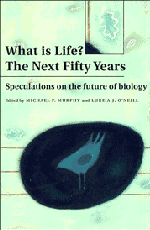Book contents
- Frontmatter
- Contents
- List of contributors
- Preface
- 1 What is Life? The next fifty years. An introduction
- 2 What will endure of 20th century biology?
- 3 ‘What is life?’ as a problem in history
- 4 The evolution of human inventiveness
- 5 Development: is the egg computable or could we generate an angel or a dinosaur?
- 6 Language and life
- 7 RNA without protein or protein without RNA?
- 8 ‘What is life?’: was Schrödinger right?
- 9 Why new physics is needed to understand the mind
- 10 Do the laws of Nature evolve?
- 11 New laws to be expected in the organism: synergetics of brain and behaviour
- 12 Order from disorder: the thermodynamics of complexity in biology
- 13 Reminiscences
- Index
13 - Reminiscences
Published online by Cambridge University Press: 03 February 2010
- Frontmatter
- Contents
- List of contributors
- Preface
- 1 What is Life? The next fifty years. An introduction
- 2 What will endure of 20th century biology?
- 3 ‘What is life?’ as a problem in history
- 4 The evolution of human inventiveness
- 5 Development: is the egg computable or could we generate an angel or a dinosaur?
- 6 Language and life
- 7 RNA without protein or protein without RNA?
- 8 ‘What is life?’: was Schrödinger right?
- 9 Why new physics is needed to understand the mind
- 10 Do the laws of Nature evolve?
- 11 New laws to be expected in the organism: synergetics of brain and behaviour
- 12 Order from disorder: the thermodynamics of complexity in biology
- 13 Reminiscences
- Index
Summary
I would like to stress that I am not a scientist, so I have accepted the invitation as an elegant gesture of loyalty towards my father to honour his memory. You will therefore excuse me for not referring to my father's work.
At a similar occasion last year in Paris I was asked to contribute biographical notes about my father and had to express my doubts concerning biographies in general. They very often give only their author's views and serve his purposes. They rarely do justice to the subjects themselves and tend to typecast them in the eyes of the public. They stick out like monuments until someone suddenly takes pleasure in pointing out their weaknesses and shortcomings, as if these actually had any meaning at all.
In our age voyeurism is very much in vogue and hardly any figure of public life, whether he be of genuine importance or not, can escape it. Anyway, a true narrative of Erwin Schrödinger's life has yet to be written. In order to be true it would have to deal with the facts only and forego fiction and any catering to the public taste.
At this point I am grateful for a quotation from Albert Einstein: ‘The essential of the being of a man of my type lies precisely in what he thinks and how he thinks, not what he does or suffers’. What Erwin Schrödinger thought and how he thought is for the greatest part common knowledge in the world of physics, and everyone who understands his language can read it, rethink it, interpret it and, if he so wishes, contradict or support it.
- Type
- Chapter
- Information
- What is Life? The Next Fifty YearsSpeculations on the Future of Biology, pp. 175 - 180Publisher: Cambridge University PressPrint publication year: 1995



